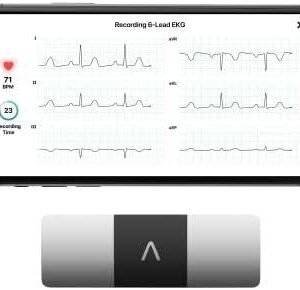In the ever-evolving landscape of healthcare, the integration of technology has emerged as a pivotal force in enhancing patient care. Among the myriad of innovations, mobile health applications, or mHealth apps, stand out as transformative tools that empower patients and healthcare providers alike. By facilitating real-time access to health information, promoting adherence to treatment protocols, and fostering greater patient engagement, these applications are redefining the dynamics of clinical interactions. This article delves into the multifaceted impacts of mobile health apps on patient care, examining their role in improving health outcomes, streamlining communication between patients and practitioners, and addressing the challenges related to adoption and data security. As we explore the current state of mHealth applications, we will also highlight case studies and expert opinions that underscore their significance in advancing modern healthcare practices. Through this investigation, we aim to illuminate the profound implications of mobile health technology for both patients and healthcare systems in their pursuit of enhanced quality of care.
Table of Contents
- Understanding the Role of Mobile Health Apps in Patient Engagement
- Evaluating Clinical Outcomes: Evidence-Based Benefits of Health Apps
- Security and Privacy Concerns in Mobile Health Applications
- Strategies for Effective Implementation and Adoption in Healthcare Settings
- Wrapping Up
Understanding the Role of Mobile Health Apps in Patient Engagement
Mobile health apps have emerged as a pivotal tool in enhancing patient engagement, fundamentally transforming the way individuals interact with their health care. By providing a platform for real-time communication, these applications enable patients to access their medical records, track symptoms, and receive educational resources instantly. This seamless access fosters a more proactive approach to health management, empowering patients to take charge of their conditions. Features such as medication reminders, appointment scheduling, and direct messaging with healthcare providers encourage persistent engagement, which can lead to improved adherence to treatment regimens and better health outcomes.
In addition to facilitating communication, mobile health apps leverage data analytics to tailor patient experiences and improve care personalization. By analyzing user behavior and health data, developers can deliver customized recommendations that resonate with individual health needs. This results in enhanced user satisfaction and adherence to recommended practices. Furthermore, apps can incorporate interactive features such as gamification, where patients earn rewards for achieving health milestones, thus incentivizing continued engagement. Below is a table showcasing the key features of mobile health apps and their impact:
| Feature | Impact on Patient Engagement |
|---|---|
| Real-time Communication | Encourages instant interaction with healthcare professionals |
| Symptom Tracking | Promotes self-monitoring and empowerment |
| Educational Resources | Increases knowledge and awareness about health conditions |
| Medication Reminders | Improves treatment adherence and reduces missed doses |
| Gamification Elements | Enhances motivation through rewards and challenges |
Evaluating Clinical Outcomes: Evidence-Based Benefits of Health Apps
In recent years, the proliferation of mobile health applications has transformed the landscape of patient care, offering clinicians a powerful tool for enhancing treatment outcomes. Research indicates significant evidence-based benefits associated with the use of these apps, particularly in chronic disease management, medication adherence, and patient engagement. By leveraging real-time data collection and monitoring capabilities, health apps allow for a tailored approach, enabling healthcare providers to adjust treatment plans swiftly based on patient-reported outcomes. This personalized care has been shown to improve patient satisfaction and adherence by allowing individuals to take an active role in their health management.
Moreover, the capability of health apps to integrate seamlessly with electronic health records (EHRs) enables better communication between patients and healthcare providers. This integration facilitates the timely sharing of information, ensuring that clinicians have access to accurate data for informed decision-making. The following table illustrates key clinical outcomes associated with mobile health app utilization:
| Outcome | Impact of Health Apps |
|---|---|
| Medication Adherence | Increased by up to 30% |
| Patient Engagement | Improved by 40% |
| Appointment Attendance | Enhanced by 20% |
| Clinical Outcomes | Overall improvement in 60% of chronic condition patients |
Security and Privacy Concerns in Mobile Health Applications
The rapid adoption of mobile health applications has raised significant security and privacy concerns among users and healthcare providers alike. These apps often handle sensitive information, such as personal health records, medication regimens, and lifestyle data, making them attractive targets for cybercriminals. The consequences of data breaches can be severe, potentially leading to identity theft or unauthorized access to medical information. Key concerns include:
- Data Encryption: Ensuring that user data is encrypted both in transit and at rest to protect against unauthorized access.
- User Authentication: Implementing robust authentication methods, such as biometrics or two-factor authentication, to verify user identity.
- Compliance: Adhering to regulations like HIPAA, which set standards for protecting patient information.
- Transparency: Providing clear privacy policies and informing users about data usage practices.
To mitigate these risks, developers must prioritize security measures from the inception of the application. Regular updates and vulnerability assessments should be a standard protocol to safeguard sensitive health information. Furthermore, creating a user-friendly interface that educates patients about privacy settings can enhance trust and encourage safe usage. The following table highlights essential security features that should be integrated into mobile health applications:
| Security Feature | Description |
|---|---|
| End-to-End Encryption | Protects data from the moment it is captured until it is received by the intended recipient. |
| Regular Security Audits | Periodic assessments to identify and rectify vulnerabilities in the application. |
| Data Anonymization | Removing personally identifiable information to protect user identity even if data is accessed. |
| User Consent Management | Ensuring users are informed and can manage their consent for data sharing. |
Strategies for Effective Implementation and Adoption in Healthcare Settings
To ensure successful integration of mobile health applications in healthcare settings, it is crucial to adopt a structured approach that addresses the unique challenges of the industry. Key strategies include:
- Stakeholder Engagement: Involve healthcare providers, patients, and IT professionals from the onset to understand their needs and expectations.
- Training Programs: Implement comprehensive training sessions for staff to enhance familiarity and comfort with the technology.
- Feedback Mechanisms: Establish channels for continuous feedback to refine app functionalities and improve user experience.
- Data Security Protocols: Prioritize the implementation of robust data protection measures to uphold patient privacy and trust.
Another fundamental aspect lies in assessing the effectiveness and ongoing relevance of the mobile health applications. This can be achieved by:
- Metrics and Analytics: Utilize key performance indicators (KPIs) to evaluate usage, engagement, and patient outcomes.
- Pilot Programs: Conduct limited rollouts to gather insights and address any unforeseen issues before a full-scale launch.
- Integration with EHR Systems: Ensure seamless interoperability with existing electronic health records to enhance workflow efficiency.
- Ongoing Support: Provide continuous technical and user support to encourage sustained usage and address emerging concerns.
Wrapping Up
the integration of mobile health apps into the healthcare landscape represents a significant advancement in enhancing patient care. By facilitating real-time communication between patients and healthcare providers, these applications empower individuals to take greater control of their health management. The data-driven insights they offer not only augment clinical decision-making but also promote a more personalized approach to treatment, ultimately leading to improved patient outcomes.
As we continue to navigate the complexities of modern healthcare, it is crucial for stakeholders—including developers, clinicians, and policymakers—to collaborate in optimizing the design and functionality of mobile health apps. This collaboration will ensure that these tools are accessible, user-friendly, and effectively integrated into existing health systems.
The future of patient care lies in harnessing the vast potential of mobile health technology, paving the way for a more efficient, responsive, and patient-centered healthcare model. Continued research and innovation in this domain will be essential to address emerging challenges and to further enhance the quality of care provided to patients globally. As we look ahead, it is clear that the role of mobile health apps will only become more integral in fostering a healthier society, driven by technology and centered around patient needs.





